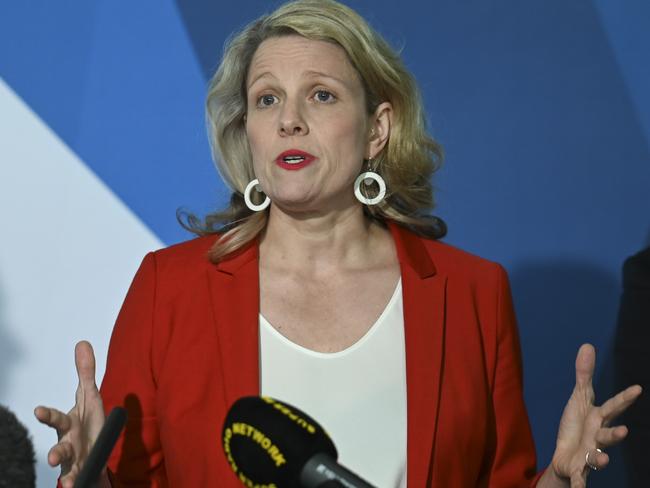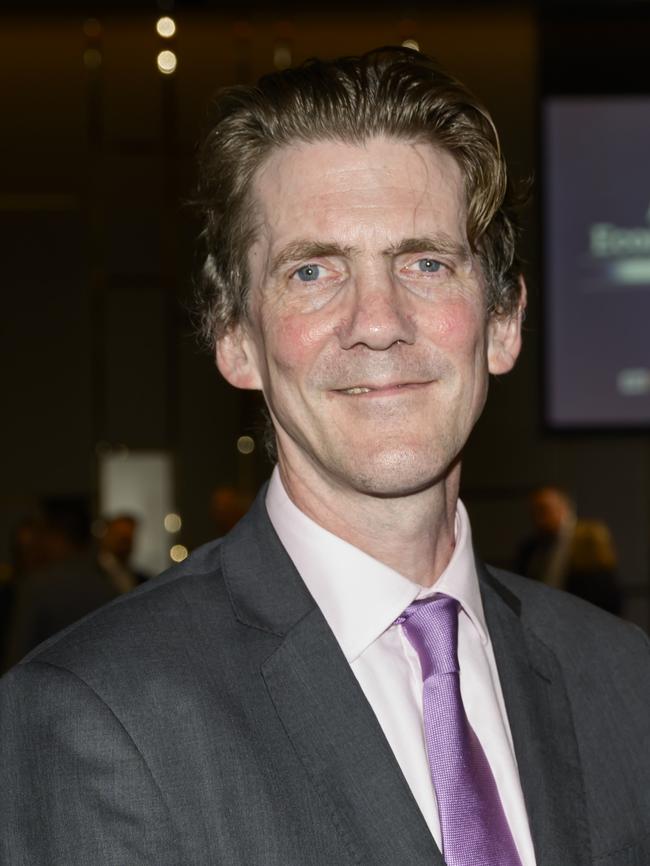Rising anxiety as trust takes a tumble
Canberra’s elites will resist it, but our democracy needs to be remade for today’s challenges.

The assassination attempt on Donald Trump last weekend has brought forth calls for unity in a deeply riven nation, marked by hyper-partisanship, social fragmentation and wealth inequality.
Australia’s leaders have appealed to the better angels of our nature and traditions; the ballot box, not bullets.
This “moment of global change”, as Anthony Albanese describes this fevered era, however, feels less like a golden opportunity and more a time when matters could tumble out of control. Opinion surveys consistently point to a democratic deficit, with an erosion of voter trust in key institutions, especially among young people born before the turn of the century. A poll for the public service commission found only one in two Australians believes democracy is on the right track. Elites are on notice.
A new OECD report this month on the Drivers of Trust in Public Institutions shows 44 per cent of respondents across 30 member countries have low or no trust in their national government. The biennial survey found a clear divide between citizen trust that is high in the day-to-day interactions with public institutions and trust in the national government’s ability to make important policy decisions involving trade-offs.
Trust is especially low, only 22 per cent, among those who feel they do not have a say in what the government does.
“Rising polarisation and citizens disengaging from traditional democratic processes place governments under increased pressure,” the report says. “In this high-stakes environment, building and maintaining trust in public institutions has emerged as a priority for governments around the world.”
This week Home Affairs Minister Clare O’Neil spoke about the battle afoot for political supremacy between democracy and autocracy. She nominated four major challenges to democracies: misinformation and disinformation, foreign interference, social cohesion and public trust.

“Defending democracy is a national responsibility,” O’Neil told a forum in Canberra. “This isn’t just about governments. We can’t do this on our own – indeed, we mustn’t do it alone. Democracy is strengthened by herd immunity against the threats I’ve discussed. There are clear steps that every Australian can take.”
The key to democratic strength, she said, was adaptation. O’Neil bristled at what she saw as “the overwhelming negativity in the global discussion about democracy”. “There is much problem-admiring, hand-wringing and darkness about the future,” she said. “For some countries, that might be the right diagnosis. But not here in Australia.”
The OECD report, for instance, shows that in the two years since the previous survey, trust levels have risen in Australia, with a sizeable leap in the share of the population who find it likely the government will change a national policy if more than half of the people express a view against it.

Recently arrived Reserve Bank deputy governor Andrew Hauser has spoken about his adopted nation’s “secret sauce” for prosperity, with our political institutions, legal system and civil service among our greatest assets. “Australians may debate the merits of its political arrangements from time to time,” Hauser told an investment conference recently. “But the country regularly scores in the top deciles of objective global measures of liberal democracy.”
Australian National University political scientist Ian McAllister tells Inquirer politicians often point to the fickleness of voters, whose expectations of what governments can provide have grown. “The problem isn’t the demand side,” McAllister says of the politicians’ lament of needy constituents. “Supply is the problem. Broken promises and governing incompetence affect voters’ views.”
There is also cleavage in the culture of rich Western nations and, as we know, politics is downstream of these at times shaky foundations. We, too, are far from immune from the big shifts that social theorist Robert Putnam described in America three decades ago in his Bowling Alone critique of US social capital decay: political polarisation, loneliness, despair and growing income inequality.
Needs of the Nation, an exclusive survey of 6000 voters for The Weekend Australian, has found in the post-pandemic realignment of loyalties and beliefs, voters are feeling less connected to political parties than their sporting teams, while yearning for leadership, better performance and stability. Solutions seem just out of reach, bipartisan policy foundations less secure, as productivity slouches and the cost-of-living squeeze endures. Workers’ purchasing power, or wages less inflation, remains at pre-pandemic levels.
The latest NAB Australian Wellbeing survey shows financial stress at an eight-year high. Less than half of those surveyed were satisfied with the way the federal government is running the country or provincial governments are managing their state or territory.
National Australia Bank head of behavioural and industry economics Dean Pearson cautions that in a survey about general wellbeing “government is never going to feature at the top of this list”, where level of education and family life typically show the highest levels of satisfaction.
There’s a lingering sense that the economic engine is not delivering and governments have not been listening to voters about their priorities. JWS Research business development manager Tom Cameron argues voters increasingly see too many politicians “off on these jaunts”.
“There’s enormous frustration in the electorate,” says Cameron, who has been an adviser to Labor in Australia and Labour in Britain.
“The research shows that people want action on their living costs and housing, and yet successive governments are so often talking about other things for extended periods. The public policy debate is regularly moving to things the general public is not focused on.
“Public policy is a diverse and complex undertaking. But enough attention isn’t being persistently applied to really delivering in the areas everyday people want it most. It’s eroding faith in public institutions and political parties.”
As we near the end of the first quarter of this century, it’s a volatile time for democracy, with the electoral centre under assault from populists of the left and right, as it is increasingly in the countries we view as similar to ours – Britain, the US and European nations that supplied the migrants in our post-war boom 70 years ago.
Last year’s referendum on an Indigenous voice revealed a two-nation split, between inner-city progressives and traditionalists in outer suburbs and regions. Political scientists detected a palpable values gap, with a strong populist sentiment in the electorate, one that surfaces more readily in referendums, with a clear yes-no choice, than elections. “People didn’t like being talked down to and you had this unity of the political and university-educated elites,” McAllister says of the voice result.
“I think populist sentiment in Australia is pretty similar to what you find in Britain and the US, if you look at the Brexit vote or people voting for Trump.
“It’s a less educated vote, people from a lower socio-economic status, people feeling much more economically pressured.”
According to the Needs of the Nation study by The Growth Distillery in collaboration with The Research Agency, only 24 per cent of Australians feel connected to their preferred political party and only 6 per cent desire to be connected (for sporting teams the respective results are 34 per cent and 7 per cent). But Australians want governments to show up on half a dozen issues that matter most.
Voters want their leaders and parties to advocate for change, provide information and influence decisions; but the gap between performance and expectation is large. On the Needs measure, while 76 per cent of those surveyed expect governments to engage on the big issues, only 44 per cent believe they’re doing well.
The gap in delivery, between expectation and performance, is greatest in environmental issues, housing accessibility and law and justice. That makes sense, given the concerns over climate change and the energy transition; home affordability, especially for young people at a time of interest-rate pain; and older Australians’ fears about rising levels of crime. Not far below those three areas are international relationships (reflected in geopolitical strife), cost of living (as high inflation batters household budgets) and community development (helping the most vulnerable).
Yet Australians remain proud and hold fast to a handful of beliefs most feel will underpin the nation’s future success: the right to a fair go, to feel secure, to back oneself to succeed, to look out for our mates and the uniqueness of our land. These pillars of national identity, according to the Needs study, are the key to renewal of trust in government and public institutions.
Looking through the lens of mindsets, or “a mental operating system that drives overall motivations and actions”, the research found that Australia has a clear skew to traditional values and individualistic orientation.
On the one hand, there is enormous potential upside for governments to win trust on climate policy and environmental protection from progressives. Yet the dominant strands in national identity suggest traditional values, family orientation and kitchen-table issues still represent the broad centre of attention for government action.
JWS Research’s Cameron argues that governments need to use a new, very pragmatic frame for policymaking and how they engage with voters in a less ideological era. “Rather than treating them as workers or business owners, it would be better to view them as consumers of government services or users of things in a technologically changing economy,” he says.
Cameron says modern politics must evolve so it is genuinely different from the past century or there will be trouble. “But as a minimum, our parliament has to find a way to lower its propensity to get distracted,” he says.
According to the Australian Election Study, after the conditions built up for several decades there was a “seismic shift” in the electorate at the 2022 election, when almost one-third of voters gave their primary vote to an independent or minor party candidate, the highest proportion in almost 100 years.
“Political partisanship for the major parties has reached record lows,” the AES said.
“Voters are more likely to switch their votes from election to election than ever before, with only 37 per cent of voters supporting the same party at each election. The proportion of voters who considered voting for another party during the campaign, at 36 per cent, has never been higher.
“Australian voters have also shown that they are open to reforms that would change the trajectory of democratic politics in Australia.”
The AES survey of voters was taken after the 2022 election to find out what shaped their choices. It found an overwhelming majority (80 per cent) of voters supported a change in the Constitution to recognise Indigenous Australians, a rise in support for a republic and majority support for a national body to investigate claims of government corruption.
But the experience of last October’s Indigenous voice to parliament referendum, where the No vote won a national majority of 60 per cent, reflects Labor’s campaign ineptitude, lack of bipartisanship, perception of risk, doubts about the proposal’s effectiveness and deep divisions in the polity.
McAllister says strong populist sentiment in the electorate played a role as well. He argues populists are significantly more likely to vote No in a referendum, even after a wide range of other factors have been taken into account.
“In the populist view of democracy, referendums are the ideal means of exercising a check on the self-interested behaviour of elites,” he writes in an April paper about populism and identity politics.
In Australia, populism, which is associated with higher levels of dissatisfaction with democracy, has been kept in check because of compulsory voting and the discipline of the party system.
As well, economic dissatisfaction, a key driver of populism in the US and Britain, has been historically less marked in Australia.
Our political system has been able to deliver consistently strong and equitable lifts in living standards. A report last week on economic mobility from the Productivity Commission shows that while the “up” escalator is still working, “there are worrying signs that people experiencing poverty face particular difficulties moving up the income distribution”.
McAllister argues “expectations on governments are huge, with half the electorate receiving a benefit of some kind”. He also warns that the settled political status quo has been showing nascent signs of change.
“Political trust is declining as government performance has been seen as inadequate and the public’s expectations of government are often unmet,” he writes in the April paper.
“Young people are being affected disproportionately by economic insecurity in the wake of the 2007-08 global financial crisis and the inability to accumulate economic assets such as home ownership, one of the cornerstones of Australian political culture.”
That slippage among a volatile, footloose part of the electorate is a sign that after the seismic shift at the 2022 election, identity and populism will feature more strongly in our party politics. Are we ready for this homegrown democratic pressure test? Clearly not with our current arrangements, despite the world-beating stamp of approval from lovestruck new chums.
McAllister, the doyen of Australian election and voter research, believes elites “are avoiding the elephant in the room – our 19th-century political institutions are not fit for purpose”.
“The big game in making democracy more relevant to citizens is institutional reform,” he says. “We have three-year parliaments, an overly complex electoral system and elites that are not as accountable as they should be to electors if they behave badly.
“At some point the penny will drop and people will ask the question: ‘How do we re-engage citizens?’ The answer to that is to redesign our political institutions and make them fit for the 21st century. Things that could be considered – and it’s a long list – are four-year parliaments, simplified electoral systems that put voters, not parties, at their centre, party primaries, term limits and deliberative assemblies.
“We know from international best practice what works and what doesn’t, so it isn’t rocket science.”




Australians are divided and anxious, while steadily losing faith in governments and public institutions to guide the nation through the uncertainty of the coming economic, climate, geostrategic and technology mega-transitions.